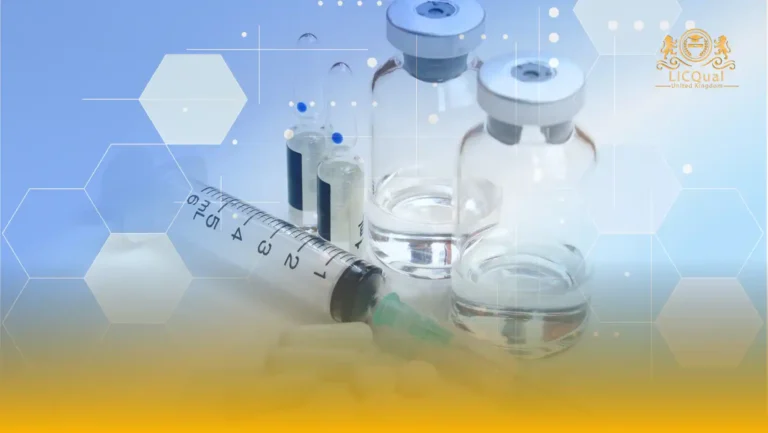The LICQual Level 3 Diploma in Pharmacoeconomics (Dip Pharmacoeconomics) is a specialised qualification designed to equip learners with advanced knowledge and skills in the economic evaluation of medicines and healthcare interventions. This programme focuses on understanding the cost-effectiveness, value assessment, and resource allocation within healthcare systems, enabling learners to make informed decisions that improve patient outcomes and optimise healthcare expenditure.
Learners undertaking this diploma will explore key concepts such as health economics, pharmacoeconomic modelling, budget impact analysis, and cost-benefit evaluation of pharmaceutical products. The course emphasises the practical application of economic principles to real-world healthcare challenges, ensuring learners are prepared to contribute effectively to decision-making processes in both clinical and policy environments.
This qualification is aimed at professionals who wish to enhance their career prospects, expand their expertise, and strengthen their commitment to Continuing Professional Development (CPD). By completing the programme, learners gain the skills required to progress into specialised roles in pharmacoeconomics, healthcare consulting, policy development, or pharmaceutical management.
Centres delivering this qualification must uphold high standards of training by employing competent and qualified staff with relevant expertise. They are also required to provide all necessary resources, facilities, and learning materials to ensure effective delivery and learner success. These measures guarantee that learners receive a structured, high-quality learning experience and are able to apply their knowledge confidently within healthcare and pharmaceutical settings.
By undertaking the LICQual Level 3 Diploma in Pharmacoeconomics, learners take a significant step towards advancing their careers while contributing to more efficient, cost-effective, and patient-focused healthcare solutions.
Course Overview
Qualification Title
LICQual Level 3 Diploma in Pharmacoeconomics (Dip Pharmacoeconomics)
Total Units
6
Total Credits
60
GLH
240
Qualification #
LICQ2201160
Qualification Specification
To enroll in the LICQual Level 3 Diploma in Pharmacoeconomics (Dip Pharmacoeconomics), applicants must meet the following criteria:
|
Qualification# |
Unit Title |
Credits |
GLH |
|---|---|---|---|
|
LICQ2201160-1 |
Introduction to Pharmacoeconomics |
10 |
40 |
|
LICQ2201160-2 |
Cost Analysis in Healthcare |
10 |
40 |
|
LICQ2201160-3 |
Health Outcomes and Economic Evaluation |
10 |
40 |
|
LICQ2201160-4 |
Budget Impact and Resource Allocation |
10 |
40 |
|
LICQ2201160-5 |
Applied Pharmacoeconomic Modelling |
10 |
40 |
|
LICQ2201160-6 |
Pharmacoeconomics Project |
10 |
40 |
By the end of this course, learners will be able to:
Unit 1: Introduction to Pharmacoeconomics
By the end of this unit, learners will be able to
- Explain the fundamental principles of pharmacoeconomics and health economics
- Describe the role of pharmacoeconomics in healthcare decision-making and policy development
- Analyse the impact of economic evaluation on patient care and healthcare systems
- Demonstrate understanding of cost, value, and efficiency in pharmaceutical interventions
Unit 2: Cost Analysis in Healthcare
By the end of this unit, learners will be able to
- Identify and categorise different types of costs associated with healthcare and medicines
- Apply methods to measure, quantify, and analyse healthcare costs
- Evaluate cost data to support informed decision-making in pharmaceutical practice
- Demonstrate understanding of the relationship between costs and healthcare outcomes
Unit 3: Health Outcomes and Economic Evaluation
By the end of this unit, learners will be able to
- Explain methods for assessing health outcomes in economic evaluations
- Apply cost-effectiveness, cost-utility, and cost-benefit analysis in pharmaceutical decision-making
- Interpret data on health outcomes to support evidence-based policy and practice
- Analyse the value of interventions in improving patient care and resource utilisation
Unit 4: Budget Impact and Resource Allocation
By the end of this unit, learners will be able to
- Assess the financial impact of introducing new medicines or interventions on healthcare budgets
- Apply principles of resource allocation to optimise healthcare delivery
- Evaluate strategies for prioritising healthcare resources effectively
- Demonstrate understanding of the role of economic analysis in policy and budget decisions
Unit 5: Applied Pharmacoeconomic Modelling
By the end of this unit, learners will be able to
- Construct pharmacoeconomic models to evaluate healthcare interventions
- Analyse model outputs to inform clinical, managerial, and policy decisions
- Apply evidence-based approaches to interpret data and make recommendations
- Demonstrate practical skills in using modelling tools and techniques
Unit 6: Pharmacoeconomics Project
By the end of this unit, learners will be able to
- Plan and design a pharmacoeconomic project addressing a real-world healthcare scenario
- Apply economic evaluation methods to analyse costs, outcomes, and value of interventions
- Demonstrate problem-solving and critical thinking in project execution
- Present project findings in a professional format, demonstrating applied pharmacoeconomic knowledge
The LICQual Level 3 Diploma in Pharmacoeconomics is ideal for
- Pharmacy professionals seeking to enhance their knowledge in health economics and cost-effectiveness of medicines
- Healthcare practitioners and managers aiming to make informed decisions on resource allocation and pharmaceutical policy
- Graduates in pharmacy, pharmaceutical sciences, health economics, or related disciplines who wish to specialise in pharmacoeconomics
- Policy analysts, healthcare consultants, and research professionals working in pharmaceutical or healthcare sectors
- Individuals committed to Continuing Professional Development (CPD) who want to strengthen their career prospects in healthcare decision-making
- Professionals aspiring to take on roles in health technology assessment, budget impact analysis, or healthcare economics
- Learners seeking practical skills to apply pharmacoeconomic principles to real-world healthcare challenges
Centres delivering the LICQual Level 3 Diploma in Pharmacoeconomics must meet high standards to ensure effective learning and successful outcomes for all learners. The following requirements should be in place:
- Qualified and Competent Staff
Centres must employ trainers, assessors, and internal quality assurers with relevant academic qualifications and professional experience in pharmacoeconomics, health economics, pharmacy, or related healthcare disciplines. - Access to Learning Resources
Centres must provide up-to-date study materials, textbooks, journals, and digital resources covering pharmacoeconomics, health economics, budget impact analysis, and cost-effectiveness evaluation. - Practical Training and Applied Learning Facilities
Centres should provide facilities to support practical exercises, case studies, modelling projects, and applied pharmacoeconomic learning activities. - Assessment and Quality Assurance Systems
Centres must implement robust assessment strategies and internal quality assurance processes to ensure reliability, consistency, and alignment with international standards. - Learner Support Services
Centres must offer academic guidance, mentorship, and access to Continuing Professional Development (CPD) resources to support learner engagement and success. - Technology and Digital Access
Centres should provide access to e-learning platforms, software tools, and digital modelling resources to facilitate flexible and blended learning. - Commitment to Compliance and Continuous Improvement
Staff must engage in ongoing CPD, maintain up-to-date knowledge, and adhere to ethical and regulatory standards in pharmacoeconomics education and training.
By meeting these centre requirements, training providers can deliver a high-quality, learner-focused programme that equips professionals with the knowledge, analytical skills, and confidence to excel in pharmacoeconomics and healthcare decision-making.
Assessment and Verification
All units within this qualification are subject to internal assessment by the approved centre and external verification by LICQual. The qualification follows a criterion-referenced assessment approach, ensuring that learners meet all specified learning outcomes.
To achieve a ‘Pass’ in any unit, learners must provide valid, sufficient, and authentic evidence demonstrating their attainment of all learning outcomes and compliance with the prescribed assessment criteria. The Assessor is responsible for evaluating the evidence and determining whether the learner has successfully met the required standards.
Assessors must maintain a clear and comprehensive audit trail, documenting the basis for their assessment decisions to ensure transparency, consistency, and compliance with quality assurance requirements.







